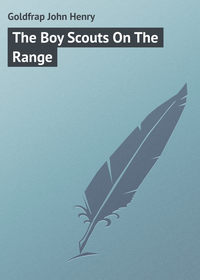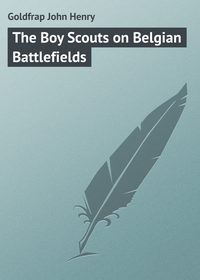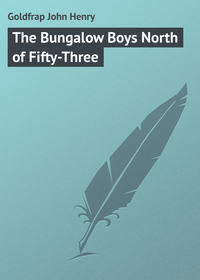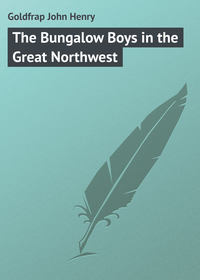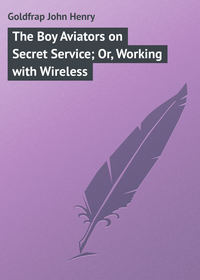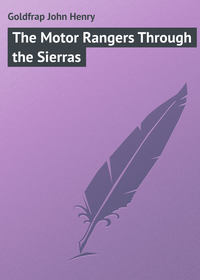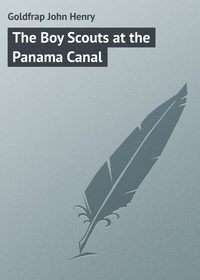 полная версия
полная версияПолная версия
The Boy Aviators in Nicaragua; or, In League with the Insurgents
Dot – dot – dot! Dot – dot! Dot – dot – dot!
It was the universal signal of desperate need that his trembling fingers spelled out: S. O. S.!1
If there were a ship fitted with wireless within the radius of their call she would come to their assistance, but both boys realized that that help would be too late to do them any good. Their one chance lay in securing the immediate attention of the craft below them.
“Fire your revolver, Harry!” shouted Frank, bending above the flaring sender spark.
The younger boy drew his magazine gun from his belt and fired all ten bullets it contained in a string of reports.
There came a blinding glare of lightning. In its radiance the boys, high in the air, could see below them the scene on the steamer as if in the light of day. The men on the steamer had evidently also seen them or heard the reports of Harry’s revolver, or what was more likely, received the wireless flash. Men were running about her decks and on the bridge the boys could see some one, evidently in command, issuing orders to several sailors who were casting loose a boat.
Their inspection was cut short. As the next flash revealed to them a boat being lowered over the side of the vessel and men pointing up at them, something parted with a loud crack.
It was one of the rudder wires that had carried away and a more serious accident at that moment could not have well befallen them. The Golden Eagle without her rudder controls heeled over drunkenly till, with a loud crashing sound, her engine was ripped clean out of her by its own weight.
The next minute the boys felt themselves dropping through what seemed endless space down to the roaring sea.
Even as they fell Frank realized that the parting of the engine from its bed had been a piece of good luck for them for relieved of that weight, there was a chance of the aeroplane floating by her own buoyancy till the boat could pick them up. All this shot through his mind in a second, and almost as it occurred to him he felt the aeroplane hit the water with a mighty thump. The next moment Frank felt the water close above his head and began fighting desperately to regain the surface.
Fortunately both he and Harry were skilled swimmers and as much at home in the water as Newfoundland dogs. As Frank at last found himself safe, clinging to the top of the half-submerged aeroplane, he anxiously looked about him for Harry. What he feared was that Harry might have got entangled in the stay wires or tiller ropes as the Golden Eagle fell into the sea.
To Frank’s unspeakable relief, however, at this juncture, he heard his name called right behind him, and a second later he had fished Harry out of the sea and hauled him up beside him on to the gradually sinking wreck of the Golden Eagle. They both joined in a lusty shout to attract the attention of the men in the boat they had seen lowered just before their dizzy fall.
Their shouts were hardly needed, however, for, from the bridge of the vessel, there shot out a long finger of radiance from the searchlight which, after sweeping about a few times, fell full on the boys. Drenched as they were they could not forbear waving their hands and giving a cheer as its light fell full on them.
Fifteen minutes later the Boy Aviators were on board the insurgent gunboat General Estrada and safe.
CHAPTER XXIV.
UNLOADING AN ARMY
After what they had passed through the previous night the boys, as may be imagined, did not awaken till late next day, to find the sun streaming through the porthole of their cabin and the ship rolling in a heavy beam-end sort of a way that showed them at once that they were at anchor. Hurriedly dressing they hastened on deck and found themselves on board what was evidently a converted yacht, to judge by her brass and mahogany fittings. Several machine guns, though, and the presence forward of hundreds of ragged soldiers gambling and chicken-fighting, showed them that they were not on board any pleasure craft, but one that was equipped strictly for business – and the grim business of war at that.
They had hardly poked their heads out of the companion before a dapper little man in a brass-buttoned sea uniform hastened up to them. This personage introduced himself as Captain Hans Scheffel, of the vessel and a former commander of a German passenger boat. In a few words he informed the boys that the craft was one of the yachts purchased by the revolutionists for conversion into gunboats and that she was at that moment anchored a few miles south of Bluefields, where it was the present plan that the revolutionaries should be put ashore and commence a march to the Rama River, and possibly across it, to gain the main body, as somewhere in the Rama country Rogero and his troops were supposed to be encamped.
The boys were much relieved to learn that the vessel on which they found themselves was not, as they had at first feared, one of the government’s craft. They well knew that the government of Nicaragua was no friend to Americans and that, in their case especially, Rogero’s enmity would make it risky, – if not actually perilous, – for them to fall into the hands of Zelayan troops.
After the first introductions and explanations of the stout little German and the profuse thanks of the boys for their rescue, he led them below to breakfast in what had been the elaborately decorated saloon of the American millionaire who formerly owned the gunboat. All the “gilt and gingerbread,” however, had been stripped from her when she was converted into a fighting-craft, and now she was as plain as a barge in her interior fittings.
The loss of their Golden Eagle had been a severe blow to the boys and they were not feeling in any too cheerful a mood as Captain Scheffel ushered them into the room and motioned to a table on which was spread an ample breakfast served by black stewards. They were just sitting down to it with healthy young appetites, that even regret over the loss of their ship could not dull, when one of the doors opening off the saloon opened and a tall, black-mustached young man of unmistakably South American descent entered.
He wore a uniform and a sword and walked with an air of assurance that made it apparent that he was a dignitary of some sort, and that this was the case was at once evidenced when the Captain, with a bow and flourish, introduced to the boys:
“Señor General Ruiz, in command of this section of General Estrada’s army.”
The name made both boys start.
“General Ruiz,” exclaimed Frank, “surely not General Ruiz – Mr. Chester’s neighbor?”
“The same;” replied the young man, with a laugh at the boy’s frank astonishment, “and you?”
“We are Frank and Harry Chester,” began Frank.
“Ah, I might have seen the family likeness,” interrupted the soldier with a smile, “forgive me for my inattention.”
“But we believed that you were dead!” exclaimed Harry. “Jose, our father’s servant, brought the news the day before we arrived in Nicaragua.”
Ruiz raised his hands with an exclamation of grief.
“My poor wife,” he exclaimed, “it must have been a sad blow to her. However, in a few days now I trust that we shall be on familiar soil and I shall be able to atone to her for her worry and grief.”
“Familiar soil – ” repeated Frank, delightedly; for this could only mean one thing.
“Yes,” replied the general, “we are to join the main force somewhere along the coast south of here and march toward La Merced. I understand that – and I am sorry to convey the news to you – that Rogero has announced that he is going to make it his headquarters.”
“His headquarters;” repeated both boys, gritting their teeth, “he would not dare.”
“Rogero would dare anything,” replied General Ruiz. “If I had not made my escape after the battle in which Jose believed me shot, I should not be here now, but a victim of Rogero’s drumhead court-martial. As it was, I had a narrow shave. Fortunately, however, for me, one of my guards was a former servant of my family, and a small bribe, combined with his loyalty to the Ruiz clan, sufficed to make him forget his charge for awhile. I made my way north and then sent messengers to General Estrada, who ordered me to take charge of the northern division which was encamped at Mazucla, fifty miles north of here and bring it down the coast on this gunboat.”
General Ruiz concluded his narrative with a few words of sympathy to the boys for the loss of their Golden Eagle which, he said, he had always hoped to see, having heard such reports of it from Mr. Chester, but supposed that would now be impossible.
“Not at all,” replied Frank bravely, “if you will come to New York six months from now you will see the Golden Eagle II, a finer, stancher craft even than the one that lies at the bottom of the Caribbean.”
Under General Ruiz’s direction the work of disembarking was gone about immediately the meal was concluded. There were five hundred men to be got ashore and runners despatched to learn the whereabouts of Estrada’s force with which Ruiz had orders to combine, besides a camp site to be found, all of which demanded expedition.
Frank and Harry watched with much eager amusement and interest the work of getting the troops ashore. Not many of the men could swim and all of them, like most Spanish-Americans, had a hearty dislike of cold water. When every once in a while one of them happened to miss his footing, in boarding the shore-boats, there would go up a cry that made even the restful blue land-crabs in the mangroves ashore scuttle for shelter.
There were no lighters to be obtained at this point of the coast of course and so the army was landed in the ship’s lifeboats – a tedious process. The boys could not help thinking what a contrast the noisy, confused scene offered to the orderly evolutions of American troops. All about the boats, as they were rowed ashore, – landed gunwale-deep with their chattering, ragged occupants, – there cruised ominously the black, three-cornered fins of the man-eating sharks that abound along this coast. Occasionally one of these monsters would actually cruise right up alongside one of the boats. At such times the hubbub became louder than ever and with a great shouting and waving of their broad-brimmed Panamas the soldiers would endeavor to drive the menacing monsters away.
One of the last boats to leave the vessel’s side was loaded until the waves almost lapped over her gunwales and it looked to the boys as if she could never reach the shore in safety. It only needed the least little ripple of a sea to send a wave toppling into her that would swamp her in a wink and spill her crew out into the water and among the sharks. Perhaps the sharks noticed this too for they clustered round till the water was almost black with their wicked torpedo-like evolutions.
“It’s a good thing there’s a smooth sea;” remarked Frank, as, with his brother, General Ruiz and the fussy little captain, he stood on the gunboat’s bridge.
“Ya;” replied the latter, “if der sea was smood not dere would food for der fishes be by sundown. I regollect vunce yen I vas ad Ceylon dot – ”
The worthy captain’s reminiscences, however, got no further. They were cut short by a cry from the heavily-laden boat which by now was several yards distant. Two of the men aboard were struggling desperately, having clinched after a wordy war that had started when she left the vessel’s side. The boys and their companions could hear the cries of protest of the crew who manned the oars:
“Sit down or you’ll have us over.”
Their warning came too late, however. The unexpected disturbance to her equilibrium had careened the overloaded boat till she was canted over to a fatal angle and the water rushed into her. With loud shouts and cries of fear her crew, and the soldiers aboard her, clung desperately to her gunwales but the sheer weight of them pulled her down and the boys could see with horrified eyes the black fins begin to rush in on the doomed men.
There was a boat that had just returned from the shore lying at the foot of the gunboat’s gangway and Frank, followed by Harry and General Ruiz, leaped into this and ordered the crew to “give way.” The men pulled like demons, at the sight of their comrades’ distress, and in a few seconds were in the thick of the battle. Already several of the poor fellows had been seized by sharks and the water about the capsized boat was crimsoned. The ravenous monsters, however, far from being glutted, were rushing in from all directions and their triangular fins shot about in the water for a space of several yards surrounding the doomed boat.
The boys and General Ruiz worked like Trojans hauling in such survivors as they could reach, and in a short time all but those the sharks had taken toll of were aboard. It was then determined to right the other boat and put some of the survivors into her and set them ashore. General Ruiz leaped into her to bale her out but as he did so his foot slipped and, with a desperate grab at the bulwark to save himself, he shot over the side into the water already red with the blood of his followers.
A cry of horror burst from the throats of the onlookers as they saw this accident. It seemed that their general was doomed to certain death. He came to the surface, however, in a moment and struck out bravely; but behind him came rushing through the water the fin of a huge shark. An agonized shout for help broke from the general’s lips as he realized his peril. He had faced death in battle a score of times but to die like this appalled him.
“Save me!” he shouted.
“Fire, Frank, fire!” shouted Harry, wild with excitement, for his elder brother with pale face and lips – but with a hand as steady as a rock – was already standing in the stern sheets of the boat with his revolver leveled.
“Steady on,” rejoined Frank, in a tense tone. “I don’t want to run any chance of the bullet deflecting.”
In the meantime the rowers had sat paralyzed at the dreadful drama being enacted under their eyes and made no effort to save the unfortunate General Ruiz. Desperately the general swam for the boat. He saw Frank standing upright in the stern and realized that the boy was waiting till he could get a fair shot at the monster. Suddenly the swimmer gave a cry, his hands shot above his head and he seemed to be literally dragged out of view.
At the same instant Frank’s revolver opened fire.
One after another the ten shots poured out and before two had been fired the men, with a cheer, saw a huge white-bellied body, armed with a terrible triple row of saw-like teeth, rear itself out of the seas as if in agony and then flop back with a mighty writhing that beat the water into waves and threatened to swamp the boat.
And General Ruiz?
A few seconds after Frank’s first shot had left the automatic revolver the swimmer was alongside the boat and being hauled inboard by a score of hands. His first action was to take Frank’s hand and grasp it with a pressure that showed him to be possessed of a muscularity rare in Latin-Americans.
“We Spaniards do not forget;” he said, after he had uttered a few warm words of gratitude to the boy who had saved his life.
“Oh,” laughed Frank, “it’s tit for tat. Didn’t you save us last night?”
General Ruiz looked grave.
“Laugh if you will, Señor,” he said, “you Americans take things more lightly than we do; but perhaps some day the time will come when I shall be able to render you service, and you will see that my words were not spoken in jest.”
That was all, but there was a ring of sincerity in his voice that left no doubt in his hearers’ minds that he meant what he said and, while both boys hoped that no contingency would ever arise in which they would be in such dire need of General Ruiz’s aid, at the same time they felt that if it ever did they had a friend to count on.
CHAPTER XXV.
LEAGUED WITH INSURGENTS
Some six hours after the work of debarkation had commenced it – in spite of the obstacles – was finished and the task of setting up camp was begun. By nightfall General Ruiz had installed his forces on an upland about half-a-mile back from the seacoast as the night-air among the coast-hugging mangrove swamps is very poisonous and a great breeder of fevers. He had, the boys found, quite a respectable equipment, consisting – besides his actual force, all of whom were armed with rifles of more or less use and modern type – of two doctors, both of whom held commissions as captains; a field telegraph outfit and four telegraphers; two machine-firing guns and three mule guns, besides some heavier field-guns of a less up-to-date pattern. Altogether, except for the dilapidated state of his men, General Ruiz was fairly well provided with the implements of modern warfare.
Ruiz himself, and his staff officers, had their tents pitched apart from the main camp and one of the latter insisted on giving up his sleeping quarters to the boys, much against their wills; but he was so insistent that they seemed more likely to offend him by refusal than by accepting his offer, so that night found them snugly ensconced in a comfortable tent equipped with two neat cots, covered with gray army-blankets, and hung with mosquito netting to keep out the myriad insect pests of the tropics.
Long after the supper had been despatched in the general’s tent and good-nights said, the boys talked over the situation. It was a novel one. Through the open flap of their tent they could see the ragged sentries pacing up and down, and, further out in the bush, came the cry of the outposts as from time to time they hailed one another. The men all slept huddled up together under ragged blankets and sacking on the ground at the opposite side of the camp, as the boys could see by their camp-fire glow, round which some of the men were still sitting up and talking.
“We should strike out for La Merced at once;” decided Frank, after the subject of their present situation had been talked over for an hour.
“I agree with you,” replied Harry, “but how are we going to do it? For all we know we might run plump into Rogero’s forces and then we should be in a peck of trouble. No, my advice is to stay with the army a few days, they are marching in our direction anyhow, and then strike off for La Merced when we get within a reasonable distance of it.”
“And poor Billy and Ben Stubbs, what will they think has become of us?” went on Frank.
“They will stay at Plateau Camp for a day or two anyhow,” rejoined Harry, “and at the end of that time they will have to come down into the valley, for their provisions will have given out.”
“That will be pretty nearly as safe for them as walking into a lion’s mouth,” objected Frank. “The country below there must be alive with government troops and they are sure to encounter them.”
“There is nothing we can do till we get back to La Merced, that is certain,” rejoined the philosophical Harry. “It’s no use crossing bridges till we come to them. If the army marches to-morrow we should be at home by the morning of the day after at the latest.”
With this reflection the boys turned in and slept like tops for two hours or so. Their awakening was a startling one. The whole air seemed filled with shouts and yells and there was a scattering sound of shots coming from somewhere in the interior of the jungle.
“It’s a night attack!” shouted Frank, springing up and hastily throwing on his clothes. “Come on, Harry!”
Both boys rushed out of their tent just as General Ruiz came to the door.
“We have been attacked,” he said, “it looks like treachery somewhere. I don’t know how many of them there are; but, so far, we have them in hand.”
“You mean we have beaten them off?” asked Frank.
Ruiz shook his head.
“I am too old a soldier to believe that Rogero would attack me with a handful,” he said. “No, boys, this attack was made by an advance guard to draw our fire and ascertain just how large a force we really have. The real attack will come in a few minutes.”
He was buckling on his sword as he spoke and thrusting his navy revolver into a holster. This completed he held out his hand.
“I must say good-bye, now,” he said briskly, “but only for a short time I hope. It is poor hospitality to rush you into the troubles of the revolutionists, but it cannot be helped.”
With a stiff salute he turned and began issuing rapid orders to his staff, who rushed over as they got them to where the demoralized troops were struggling confusedly for their banked rifles. In a short time something like order had been restored and a corps of men sent out with machetes to clear paths into the high ground where the guns were to be planted.
“He means to plant some guns above there,” pointed Frank, “so as to command the valley when the real attack comes.”
At this moment one of the officers hurried up.
“You had better get to shelter, young gentlemen,” he said, “the trouble will begin in a few minutes and I expect it will be a hot engagement when it starts.”
Frank and Harry shook their heads. To the two high-spirited boys, facing their first taste of real warfare, to be ordered into shelter did not appeal at all.
“Can’t we do something to make ourselves useful?” asked Frank, as a company of men at a silent “double-quick” swung by into the jungle, where the scattering fire that had awakened them had died out.
“If the señors really mean that, I will see the general;” courteously replied the officer, hurrying off.
“We have never smelled powder before,” exclaimed Harry, “and we don’t mean to be sent back to the commissariat when we have a chance to see some real fighting; eh, Frank?”
“Not much,” replied Frank, “of course, I suppose, as American citizens and neutral parties, etc., we ought to sit back with our hands folded; but when I think of the threats Rogero made to father I’d like to get a crack at some of those fellows myself.”
“I’m with you, Frank, old fellow,” cried Harry warmly. “Come on, let’s get on our revolvers and see if the general has anything for two peaceful non-combatants who want to fight.”
As they came out of the tent with their revolvers strapped on and also a rifle each – which they took the liberty of selecting from a rack of arms left in the tent by the officer who had vacated it for them – they felt that they were on the eve of a really exciting experience.
They had walked only a few steps when a figure, that they soon made out to be General Ruiz himself, stepped up to them.
“Captain Alvarez tells me,” he said, “that you young men are pining for action and do not care to sit on the idlers’ bench while we are fighting. Now I have a mission for you.”
“Yes,” chorused Frank and Harry delighted.
“But it is a dangerous one and will require a lot of skill and care to bring it to a successful conclusion.”
The boys begged him to tell them what it was. They assured him that they would not fail in anything he might entrust to them.
“Simply this;” replied General Ruiz, looking them straight in the eyes, “there is a lot of ammunition aboard the ship that I meant to bring ashore to-morrow morning, but it is now imperative, with the turn affairs have taken, that we have it here before many hours. I have not a man in the ranks I dare trust on such a mission and I cannot spare any of my officers. Will you do it?”
Of course the boys said they would. To tell the truth they were rather disappointed. Bringing ammunition ashore was rather more prosaic work than they had bargained for; but still, having promised to be of what aid they could, they could not go back on their words.
“You take one of the boats on the beach,” went on the General – and the boys noticed that he was now the officer addressing his subordinates and not the courteous friend – “and row off to the gunboat. Captain Scheffel will give you the keys to the magazine and you are to bring off as much at a time as you think wise. I wish to remind you, however, that we need the extra ammunition in a hurry.”
“Now,” he continued, in a less official tone, “I shall be answerable to your father for you and I don’t want you to run any unnecessary risks.”
“I don’t see what risks we can run, except from sharks, rowing powder and ammunition ashore in a ship’s lifeboat,” Frank could not forbear saying.
General Ruiz was quick to catch his tone.
“A good soldier’s first duty is to obey,” he said, “no matter how much he may dislike the duty he is assigned to.”




